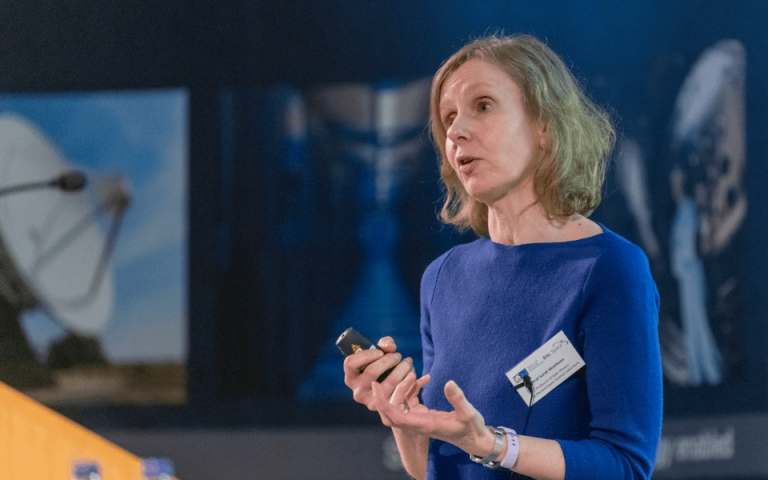Professor Sarah Matthews
Professor Sarah Matthews is the Head of the Solar Physics group at UCL Mullard Space Science Laboratory, Head of Education for the department and Lead for one of department’s MSc programmes.

3 April 2023
When did you take up this position? What was your position beforehand?
I’ve been Head of Solar Physics and MSc programme lead since 2016, the Principal Investigator for the EUV Imaging Spectrometer (EIS) on the Hinode space mission since 2019, and Head of Education since 2020. I started working at UCL straight after finishing my PhD when I took up a Post Doc position and have been here ever since, cycling though the stages of lecturer, reader and then professor.
Tell us about your work at UCL - how do you spend your days, and what makes your role different to similar positions elsewhere?
My days are always full and never the same. Because the space mission projects I work on include partners in some widely spaced time zones there are some early morning and late night meetings.
On Hinode we have recently been helping to coordinate support for the upcoming Solar Orbiter remote sensing window. Solar Orbiter has major instrument involvements from the solar and space plasma groups at MSSL, so some of these campaigns are being led by our students and PDRAs. We’ve been busy helping the Orbiter people identify the best Hinode observations to achieve their science goals, including developing new studies where needed.
A lot of my time over the last couple of years has also been spent working towards securing funding to participate in the follow-up space mission to Hinode, called Solar-C. That included a lot of politics, proposal writing, working with an amazing team of engineers to design our contribution, and the broader international team. We hope we’re almost at the end of that phase, but then life will get even busier as we move into detailed design and build.
I combine those activities with teaching, student support, teaching quality assurance and planning and research student supervision. I also contribute to various other Departmental and Faculty committees, as well as some external ones.
What are some of your favourite things about working at UCL?
The people are the best thing. The sheer range of expertise at UCL is phenomenal and everybody’s willingness to help, discuss and collaborate makes up for some of the more frustrating aspects of academic life. I also get huge satisfaction watching the MSc Space Science & Engineering students do their final group presentation. It is always so impressive to see just how much they have all achieved over the year.
Can you tell us about any upcoming research, or future projects that you're looking forward to working on?
Solar-C is the next big thing. We will hopefully be building an Extreme Ultraviolet (EUV) camera that will complement three other UV cameras and a spectral irradiance monitor that will measure irradiance at the same wavelengths.
The EUV and UV cameras will record spectral images with high spatial resolution throughout the whole solar atmosphere which will really transform our ability to understand, and hopefully predict, how, when and where energy is released, particularly for space weather events.
The irradiance monitor will provide measurements in wavelengths that show the greatest variability but are still not well incorporated into climate models.
Have you always been based in London? If not, when did you move here, and how did you find adapting to living in London?
I’m not really based in London because our Department is in the Surrey Hills, although I am on the main campus most weeks. I was in Glasgow before moving here and can say that the weather is definitely better here(!) but the thing I noticed initially, albeit it’s a long time ago now, was that people don’t talk to strangers as much down South.
It also took me a long time to adjust to the fact that you can’t just pop out to the bank or the post office in 10 mins at lunchtime from MSSL. The environment makes up for that though. And I still get the buzz of being on campus.
Finally, tell us about your non-work life. Do you have any hobbies, or favourite places to go in London?
There’s quite a lot of encouraging teenagers to revise for GCSEs and A-levels currently, but I like to collect contemporary art from local and Scottish artists, at the lower end of the cost scale, I hasten to add! I also developed a bit of a plant obsession during lockdown.
 Close
Close

